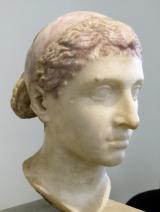من واعد Cleopatra VII؟
Julius Caesar مؤرخCleopatra VII من? حتى?. كان الفارق العمري 30 سنة و 6 شهر و 10 يوم أيام..
Gnaeus Pompeius Magnus مؤرخCleopatra VII من? حتى?.
Cleopatra VII

Cleopatra VII Thea Philopator (Koine Greek: Κλεοπάτρα Θεά Φιλοπάτωρ, lit. 'Cleopatra father-loving goddess'; 70/69 BC – 10 or 12 August 30 BC) was Queen of the Ptolemaic Kingdom of Egypt from 51 to 30 BC, and the last active Hellenistic pharaoh. A member of the Ptolemaic dynasty, she was a descendant of its founder Ptolemy I Soter, a Macedonian Greek general and companion of Alexander the Great. Her first language was Koine Greek, and she is the only Ptolemaic ruler known to have learned the Egyptian language, among several others. After her death, Egypt became a province of the Roman Empire, marking the end of the Hellenistic period in the Mediterranean, which had begun during the reign of Alexander (336–323 BC).
Born in Alexandria, Cleopatra was the daughter of Ptolemy XII Auletes, who named her his heir before his death in 51 BC. Cleopatra began her reign alongside her brother Ptolemy XIII, but falling-out between them led to a civil war. Roman statesman Pompey fled to Egypt after losing the 48 BC Battle of Pharsalus against his rival Julius Caesar, the Roman dictator, in Caesar's civil war. Pompey had been a political ally of Ptolemy XII, but Ptolemy XIII had him ambushed and killed before Caesar arrived and occupied Alexandria. Caesar then attempted to reconcile the rival Ptolemaic siblings, but Ptolemy XIII's forces besieged Cleopatra and Caesar at the palace. Shortly after the siege was lifted by reinforcements, Ptolemy XIII died in the Battle of the Nile. Caesar declared Cleopatra and her brother Ptolemy XIV joint rulers, and maintained a private affair with Cleopatra which produced a son, Caesarion. Cleopatra traveled to Rome as a client queen in 46 and 44 BC, where she stayed at Caesar's villa. After Caesar's assassination, followed shortly afterwards by the sudden death of Ptolemy XIV (possibly murdered on Cleopatra's order), she named Caesarion co-ruler as Ptolemy XV.
In the Liberators' civil war of 43–42 BC, Cleopatra sided with the Roman Second Triumvirate formed by Caesar's heir Octavian, Mark Antony, and Marcus Aemilius Lepidus. After their meeting at Tarsos in 41 BC, the queen had an affair with Antony which produced three children. Antony became increasingly reliant on Cleopatra for both funding and military aid during his invasions of the Parthian Empire and the Kingdom of Armenia. The Donations of Alexandria declared their children rulers over various territories under Antony's authority. Octavian portrayed this event as an act of treason, forced Antony's allies in the Roman Senate to flee Rome in 32 BC, and declared war on Cleopatra. After defeating Antony and Cleopatra's naval fleet at the 31 BC Battle of Actium, Octavian's forces invaded Egypt in 30 BC and defeated Antony, leading to Antony's suicide. After his death, Cleopatra reportedly killed herself, probably by poisoning, to avoid being publicly displayed by Octavian in Roman triumphal procession.
Cleopatra's legacy survives in ancient and modern works of art. Roman historiography and Latin poetry produced a generally critical view of the queen that pervaded later Medieval and Renaissance literature. In the visual arts, her ancient depictions include Roman busts, paintings, and sculptures, cameo carvings and glass, Ptolemaic and Roman coinage, and reliefs. In Renaissance and Baroque art, she was the subject of many works including operas, paintings, poetry, sculptures, and theatrical dramas. She has become a pop culture icon of Egyptomania since the Victorian era, and in modern times, Cleopatra has appeared in the applied and fine arts, burlesque satire, Hollywood films, and brand images for commercial products.
اقرأ المزيد...Julius Caesar

غَايُوس يُولِيُوس قَيْصَر (باليونانية:Ιούλιος Καίσαρ) (باللاتينية: CAIVS•IVLIVS•CAESAR•IV ،Gaius Iulius Caesar) هو جنرال وقائد سياسي وكاتب روماني ولد عام 12 يوليو 100 قبل الميلاد، قاد یولیوس قيصر الجيوش الرومانية في حروب الغال الأهلیة وأصبح بعد ذلك حاکمًا لروما من سنة 49 قبل الميلاد حتى اغتياله في 15 مارس سنة 44 قبل الميلاد. لعب يوليوس قيصر دورًا مهمًا في الأحداث التي أدت إلى ثورة تحويل روما من جمهورية إلى إمبراطورية.
شكَّل يوليوس قيصر مع حلفائه بومبيوس الكبير وماركوس كراسوس الحكم الثلاثي الأول الذي قام في الفترة الأخيرة من تاريخ الجمهورية الرومانية تحديدًا سنة 60 قبل الميلاد والذي سيطر على السياسة الرومانية لعدة سنوات. انتصر يوليوس قيصر في سلسلة من حروب الغال التي امتدت حتى عام 51 قبل الميلاد وشملت عددًا كبيرًا من الأراضي الرومانية، ليصبح قيصر بعد ذلك أحد أقوى السياسيين في الجمهورية الرومانية. خلال هذا الوقت غزى يوليوس قيصر بريطانيا وبنى جسرًا عبر نهر الراين، إذ دعمت هذه الإنجازات مكانة قيصر وتغلب على بومبيوس الكبير الذي انتمى إلى مجلس الشيوخ بعد وفاة ماركوس كراسوس في سنة 53 قبل الميلاد. أمر مجلس الشيوخ بمجرد انتهاء حروب الغال بتنحي قيصر عن القيادة العسكرية والعودة إلى روما، لكن قيصر تحدى السلطة علنًا في عام 49 قبل الميلاد وعبر نهر روبيكون وسار نحو روما مصطحبًا معه جيشه ليبدأ حربًا أهلية والتي انتهت بانتصاره فيها سنة 45 قبل الميلاد.
بدأ يوليوس حملة للإصلاحات الاجتماعية والحكومية بعد سيطرته على الحكم، وشملت الإصلاحات إنشاء التقويم اليولياني ومنح الجنسية للعديد من سكان المناطق البعيدة وإصلاح الأراضي ودعم المحاربين القدامى. أُعلن قيصر دكتاتور دائم مدى الحياة بعد أن غير بيروقراطية روما وكان يواجه غضبًا شديدًا من المتآمرين ضده بعد الانتصارات التي حققها يوليوس قيصر في خارج روما ونجاحه في إخماد الحرب الأهلية هناك وتمام سيطرته. اغتيل قيصر على يد مجموعة من أعضاء مجلس الشيوخ المتمردين بقيادة مرقس يونيوس بروتس وغايوس كاسيوس لونغينوس في يوم إديس مارس (يتوافق هذا اليوم مع 15 مارس وهو يوم للاحتفالات الدينية في روما) سنة 44 قبل الميلاد. اندلعت بعد اغتيال قيصر سلسلة جديدة من الحروب الأهلية ولم تُسْتَعَاد الحكومة الدستورية للجمهورية بالكامل. صعد ابن شقيق قيصر ووريثه المعتمد أوكتافيان إلى السلطة الوحيدة بعد هزيمة خصومه في الحرب الأهلية الأخيرة للجمهورية الرومانية وبدأ عصر الإمبراطورية الرومانية.
كان قيصر مؤلفًا بارعًا ومؤرخًا ورجل سياسي، وتُعتبر رواياته الخاصة مصدرًا مهمًا لسيرة حياته وخصوصًا حملاته العسكرية. تشمل المصادر المعاصرة الأخرى رسائل وخطب شيشرون والكتابات التاريخية لسالوست. كما عمل المؤرخ الروماني سويتونيوس وبلوتراش على كتابة السيرة الذاتية اللاحقة لقيصر، شغلت سيرة حياة قيصر تفكير أغلب المؤرخين وذلك لأنه من أحد أعظم القادة العسكريين في التاريخ، إذ اعتمد لقبه (قيصر) في أنحاء روما على أنه مرادف لكلمة (الإمبراطور). ظهر يوليوس قيصر في الكثير من الأعمال الأدبية والفنية، وكانت فلسفته السياسية -المعروفة باسم الفلسفة القيصرية- مصدر إلهام للعديد من السياسيين في العصر الحديث.
اقرأ المزيد...Cleopatra VII

Gnaeus Pompeius Magnus

Gnaeus Pompeius Magnus (ca. 75 BC – 12 April 45 BC) was a Roman politician and general from the late Republic (1st century BC).
اقرأ المزيد...